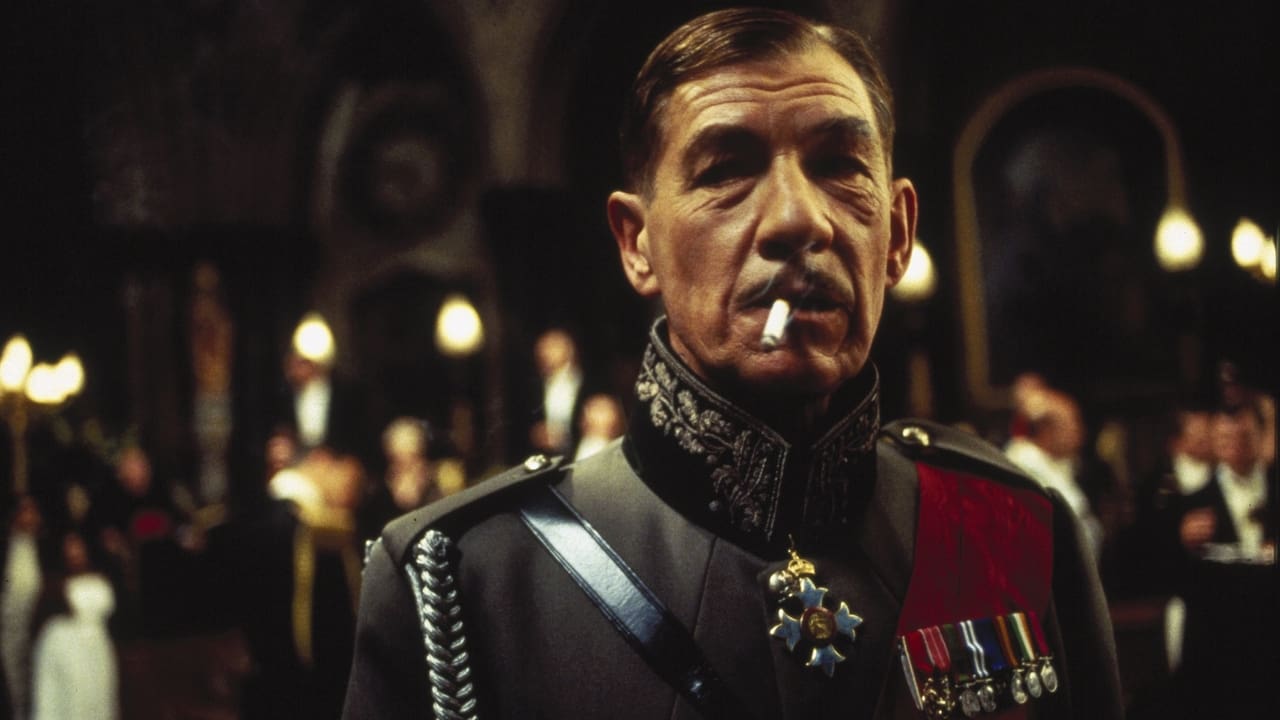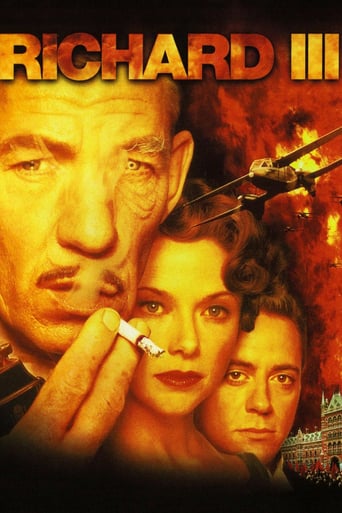

more than an innovative adaptation of the Shakespeare's play, it is an experience. an exercise of memory, a lesson of history, an admirable work who presents slices from a WWII in a special manner. story about power, it becomes testimony about the illness of a century by each of its dictatorship. story about tyranny, it is a warning and remarkable tool for remember the universal message of Shakespeare work. the cast, the music, the image - all is perfect. in few moments , the only problem becomes the forced context for the Shakespeare words. but the situation is saved by the spirit of play. more than an eccentric adaptation, great performances, it is pure history lesson. few scenes - strong and touching - are necessaries proofs.
... View More....understand the left (marxist-leninists) always love films that depict the 'evil' with a khaki uniform and the hardware in tow - i.e. 'Hitler'is such a 'lock' to embrace the college kids. What secured my affection was the remark (mind you truly Shakespeare) when Annette Benning replied to 'Richard's' (Ian McKellen) inquiry as to what she thought of him i.e. "What thinkest of me madame?" Her laser reply "Thou art a bottled spider!" We have today in 2013 some 18 years hence the reality of a world continuing into the 'abyss' and mind you, not a moment of pause as the patricians ignore the free fall - (abortion, gay gay all over, SEIU, the usual entitlement idiocy) this is all Richard III is about. No - not the clutter and self induced suicide of the antagonist but the wrecking of decorum to slate the thirst of licentiousness and most of all for 'power'.This is what tyrants loathe the most - use of satire to magnify the con - remember that great Jack In The Box TV ad some 12 years ago? The condescending monarch commenting on the sandwiches presented to him? "Peanut butter!" and the scullion daring to say "Where's the butter?" with the reply "SILENCE!"
... View MoreAn anachronistic performance of Shakespeare's play, using most, if not all, of the lines from the original. As I understand it, some characters have been combined, but that's the nature of adaptations.It's basically the same play, in other words, only the settings and the costumes are from the 1930s/40s. I think that helps make the play less distant, though I don't have any firm evidence to back that up. Also, there are some fantastic performances here. Ian McKellen is wonderfully villainous as Richard. And if you want to see Robert Downey, Jr. stabbed in the back while "in the throes of passion", if you know what I mean, this is the movie for you.One last thing: I've both read and seen performances of multiple Shakespeare plays, and I would definitely recommend watching a performance, if you can, because this performance made it much easier to see all the Tudor propaganda that Shakespeare stuffed into the play (Richard is a hunchbacked, crippled sociopath who murders his way to the top and tries to marry his niece, while the Duke of Richmond, the future Henry VII, is a really nice guy whose heirs will, according to Shakespeare, bring peace to England; also, Richard is associated with lots of Hitler-esque paraphernalia). I enjoyed it very much.
... View MoreFirst the good: the movement to modern neo-fascism was interesting, the twist on many of the speeches was fascinating (which is one of the pleasures of re-doing Shakespeare - viz. the interpretation), McKellen is great, and most of the supporting cast is solid.What I didn't like as much: some of the choices regarding what dialogue to keep and what to discard. Losing some of the opening soliloquy was unnecessary and a crime to Richard III fans. Benning and Downey Jr are not good in this - I like them in other films but here they sounded as if they were reciting lines that they had carefully memorized - very unnatural. But mostly where I think this falls short of the Olivier version is in the believability of Richard as a charmer. Olivier makes you believe that Richard could fool people. In this version, Richard is so blatantly evil that nobody could be deceived by him. Maybe they aren't supposed to be in this version but Richard III is one of the all-time great villains because he could charm people (a la Hannibal Lecter). Not here.
... View More